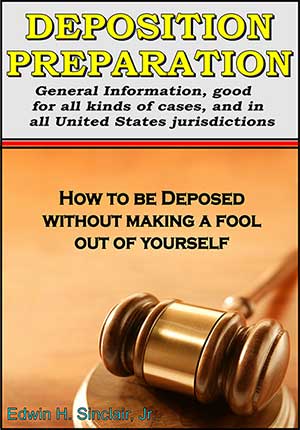Deposition Preparation DVD (and/or) BOOK |
Learn how to be deposed without
making a fool out of yourself

|
|
| DVD Ordering information | Paperback book Ordering information | AudioBook Ordering Information |
|
For Law Firms:
|
We have attorneys all over the country who have authorized us to keep their credit card numbers on file so that they can simply e-mail us the names and addresses of persons to whom they want Deposition DVDs sent out, and we do so - immediately upon receipt of their requests. |
|
Tips For Clients:
|
|
The standard rule in courtroom direct and cross-examination is "don't ask a question unless you already know the answer." Of course, this gives rise to the question of "if you already know the answer, why ask the question?" and the answer is that it is the lawyer's responsibility to have his or her client's case presented to the court in the most believable manner... and that is from the testimony of independent third persons who are not on the lawyer's side (like the client, the client's mother, etc.). Therefore, if the lawyer wants 'strangers' to testify and say things that are helpful to the case, it is advisable for that lawyer to find out what the people testifying know in advance, and how they will answer questions at trial. Once a lawsuit is filed, the court will allow each side to get some information about the other side. This process is called "discovery" and usually takes the form of written Interrogatories (questions sent to the other party), Subpoena Duces Tecem (requiring the other side to give you documents) - and the thing that we are concerned with here: oral Depositions, where the lawyer can command anyone who can be served with proper notice to appear in person and answer questions. A lawyer preparing a case will usually send the other party a set of written Interrogatories to discover (among other things) who prospective witnesses could be and what documents might be helpful. The lawyer then sends out a subpoena for the documents and also has a process server serve notice on the prospective witnesses (or anyone who the lawyer believes has helpful information) to appear at an oral Deposition, at which time the lawyer will question that person in front of a court reporter. Court reporters are notary publics and qualified to swear witnesses in, so that the witness' ("deponent's") testimony can be given under oath, under penalty of perjury. The reporter takes down everything that is said at the deposition and then prepares a written copy ("transcript") which the person being deposed will be asked to sign in front of a notary. This "nails down" the witness' testimony, so as to avoid changes of memory that might occur between the deposition and the trial. Remember: when being deposed, you are under oath and must tell the truth! (of course, you should always tell the truth, but especially so during a deposition). The fact that the deposition takes place somewhere other than a courtroom (usually a lawyer's office) does not detract from the fact that it is still a formal court-ordered proceeding. Any problems that arise during the deposition may be brought to the attention of a judge either before the trial (so that the judge can order people to behave differently and possibly have another deposition taken) or at the time of trial. Here are some important tips to remember, if you are going to have your deposition taken: 1) Always tell the truth to the best of your recollection. Don't worry about answering that you don't remember some particular fact. Quite often a deposition or trial may take place many years after the sued-upon event: no-one is expected to have a photographic memory of past events. Don't allow yourself to be intimidated into answering in an untruthful way that you don't want to. 2) If you don't understand a question, don't hesitate to say that you don't and ask that it be repeated or re-asked in a simpler way, so that you can understand it. 3) Don't volunteer any information! Answer the question as courteously and briefly as possible. If a one-word answer ("yes" or "no") will suffice, then use it. 4) Don't be a smart aleck! No cute answers. This is a serious part of the lawsuit, no matter how friendly the person on the other side taking your deposition may appear to be. 5) Don't rush your answer. Sometimes the other lawyer will speed up the pace of the questioning, hoping to lead you to blurt out something that you might not otherwise wish to mention. Give your attorney the opportunity to object to the question. If the other lawyer starts to shout or try to intimidate you, just follow you own lawyer's instructions: if your lawyer instructs you not to answer, then don't! As stated above, if the other attorney isn't happy, the issue can be brought into court, where a judge will look at the transcript and issue a ruling. And remember, anyone who testifies differently in court than they did in written Interrogatories or at an oral Deposition runs the risk of having their prior inconsistency being rubbed right in their nose as they sit there on the witness stand. The other attorney will point out to the court (judge, jury, etc.) that you've changed your story - and you will look like a liar. Worse than that, you also run the risk of being charged with the crime of perjury like Mark Fuhrman, Martha Stewart and Scooter Libby. This DVD was prepared with the cooperation of a Bar Association. The participants act out various situations that demonstrate proper conduct during deposition and trial, so that if you are going to have your deposition taken, you should definitely watch this DVD. It is our item #102 and is available now for only $39.95 |
